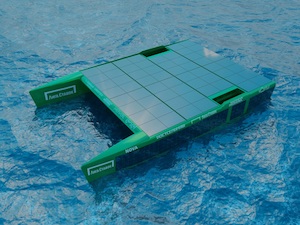The serial adventurer will spend about 100 days alone in the ocean, covering about 3,000 nautical miles a month. The odyssey will start in Valparaiso (Chile) along the coast of South America, towards Lima (Peru) and then through French Polynesia all the way to Brisbane in Australia.
Konyukhov’s vessel, a catamaran NOVA, is 11m long, 7m wide and able to reach speeds of 5-7 knots. The catamaran, which has a displacement of 2.2 tons, was designed by English racer and engineer Phil Morrison. Its hull is made of carbon-fiber composites.
The vessel is driven by electric motors and has no adverse effect on the ocean or atmosphere. In order to generate enough energy to supply the boat, the catamaran is equipped with PV modules with a total capacity of 11 kW covering an area of 66 m2 on the vessel. The sides of the hull will also carry panels, providing an additional 12m2 per side. Whilst these panels are not expected to be as efficient as the deck panels it is hoped they will gather valuable additional energy when the sun is low on the horizon and from light reflected off the water surface. The PV system consists of flexible heterojunction solar modules produced by Hevel Group, which has designed cells that are resistant to hostile environments, e.g., salt water and UV radiation.
Solar power is used not only to keep the vessel going, but also to guarantee the supply of fresh water, as the boat is equipped with a desalination system powered by solar-generated electricity.
During the voyage, Konuykhov will keep a video blog and monitor the plastic pollution of Pacific Ocean. The collected data will be further analyzed by the Russian Academy of Sciences.
Oscar Konuykhov, the team leader of the expedition project, is excited about the capabilities of the vessel: “It can stay autonomous in the ocean for up to 6 months and go as far as needed, without any limitations. State-of-the-art technologies allow it to monitor the environment and take water samples automatically. Built with proven technologies, NOVA can run in dangerous environmental conditions, even in disaster areas”.
Hevel CEO, Igor Shakhray, said: “Fedor Konuykhov constantly challenges both himself and the limits of existing technologies. We are sure that such projects are an ideal way to demonstrate the capacities of solar power and push R&D even further. Aquatic applications of solar are evolving fast and I’m sure we will soon see commercial PV-based marine transport of all sizes. Solar-powered vessels represent the perfect kind of transport for delicate ecosystems, but in order to preserve the planet’s water resources we must treat every body of water as fragile”.


